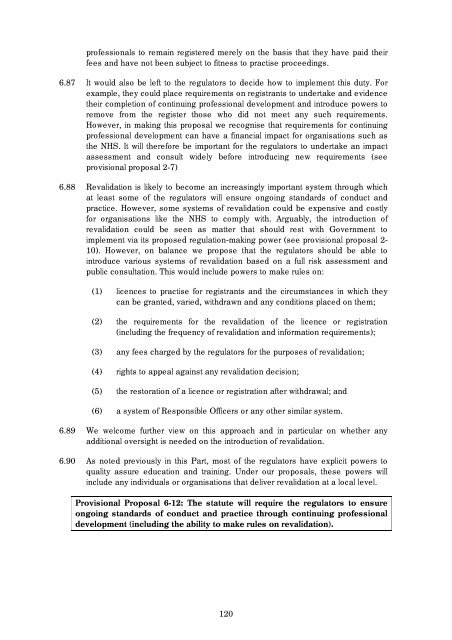Regulation of Health and Social Care Professionals Consultation
Regulation of Health and Social Care Professionals Consultation
Regulation of Health and Social Care Professionals Consultation
Create successful ePaper yourself
Turn your PDF publications into a flip-book with our unique Google optimized e-Paper software.
pr<strong>of</strong>essionals to remain registered merely on the basis that they have paid their<br />
fees <strong>and</strong> have not been subject to fitness to practise proceedings.<br />
6.87 It would also be left to the regulators to decide how to implement this duty. For<br />
example, they could place requirements on registrants to undertake <strong>and</strong> evidence<br />
their completion <strong>of</strong> continuing pr<strong>of</strong>essional development <strong>and</strong> introduce powers to<br />
remove from the register those who did not meet any such requirements.<br />
However, in making this proposal we recognise that requirements for continuing<br />
pr<strong>of</strong>essional development can have a financial impact for organisations such as<br />
the NHS. It will therefore be important for the regulators to undertake an impact<br />
assessment <strong>and</strong> consult widely before introducing new requirements (see<br />
provisional proposal 2-7)<br />
6.88 Revalidation is likely to become an increasingly important system through which<br />
at least some <strong>of</strong> the regulators will ensure ongoing st<strong>and</strong>ards <strong>of</strong> conduct <strong>and</strong><br />
practice. However, some systems <strong>of</strong> revalidation could be expensive <strong>and</strong> costly<br />
for organisations like the NHS to comply with. Arguably, the introduction <strong>of</strong><br />
revalidation could be seen as matter that should rest with Government to<br />
implement via its proposed regulation-making power (see provisional proposal 2-<br />
10). However, on balance we propose that the regulators should be able to<br />
introduce various systems <strong>of</strong> revalidation based on a full risk assessment <strong>and</strong><br />
public consultation. This would include powers to make rules on:<br />
(1) licences to practise for registrants <strong>and</strong> the circumstances in which they<br />
can be granted, varied, withdrawn <strong>and</strong> any conditions placed on them;<br />
(2) the requirements for the revalidation <strong>of</strong> the licence or registration<br />
(including the frequency <strong>of</strong> revalidation <strong>and</strong> information requirements);<br />
(3) any fees charged by the regulators for the purposes <strong>of</strong> revalidation;<br />
(4) rights to appeal against any revalidation decision;<br />
(5) the restoration <strong>of</strong> a licence or registration after withdrawal; <strong>and</strong><br />
(6) a system <strong>of</strong> Responsible Officers or any other similar system.<br />
6.89 We welcome further view on this approach <strong>and</strong> in particular on whether any<br />
additional oversight is needed on the introduction <strong>of</strong> revalidation.<br />
6.90 As noted previously in this Part, most <strong>of</strong> the regulators have explicit powers to<br />
quality assure education <strong>and</strong> training. Under our proposals, these powers will<br />
include any individuals or organisations that deliver revalidation at a local level.<br />
Provisional Proposal 6-12: The statute will require the regulators to ensure<br />
ongoing st<strong>and</strong>ards <strong>of</strong> conduct <strong>and</strong> practice through continuing pr<strong>of</strong>essional<br />
development (including the ability to make rules on revalidation).<br />
120
















